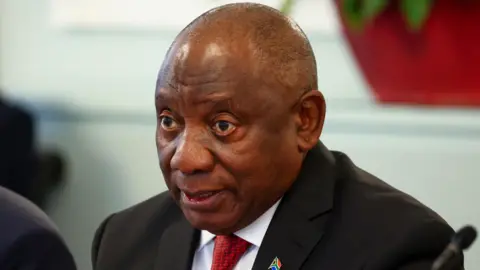‘Broken My Hope’: Trump’s Move to Slash Refugee Arrivals Ricochets Widely

© Mahmud Hossain Opu/Associated Press

© Mahmud Hossain Opu/Associated Press

© Tierney L. Cross/The New York Times

© Dakota Santiago for The New York Times

© Doug Mills/The New York Times

© Bryan Anselm for The New York Times

© Jamie Kelter Davis for The New York Times

© Rosem Morton for The New York Times

© Dustin Chambers for The New York Times

© Finbarr O'Reilly for The New York Times

© Nasuna Stuart-Ulin for The New York Times

© Pablo Porciuncula/Agence France-Presse — Getty Images

© Wagner Meier/Getty Images

© Rungroj Yongrit/EPA, via Shutterstock

日本防卫大臣小泉进次郎周四在TBS电视台的节目中提到了日本引进核潜艇的必要性。他提及美国总统特朗普批准韩国建造核潜艇一事,并指出日本“周边国家都拥有核潜艇”。
关于潜艇的动力来源,小泉进次郎表示:“日本周边环境已变得如此严峻,以至于我们现在不得不讨论是继续使用柴油动力还是核动力,就像我们迄今为止所做的那样”。
小泉进次郎还提到,本月初他访问马来西亚期间,东盟防长扩大会的与会国中有一个国家对日本的二手潜艇表示了兴趣。据了解,日本拥有大约20艘潜艇,但没有操作任何核动力潜艇。
首尔方面, 韩国政府官员周二表示,美国借韩美首脑会谈之机同意韩国获得核动力潜艇燃料,预计韩国自主建造的核动力潜艇将在2030年代中后期下水。
韩联社报导指,韩国国防部资源管理室室长元锺大当天在总统李在明主持的国务会议上报告如上。他指出,韩美就建造核动力潜艇中的最大难题——燃料供应问题取得协商进展,为推进相关项目创造了良好条件。
元锺大称,韩国政府目前正着手掌握可搭载于核潜艇的反应堆、武器系统等建造所需的核心技术,并开展安全性验证工作。常规潜艇方面,韩国已具备世界一流水平的设计与建造能力。综合多种因素研判,韩国可自主建造核动力潜艇。若经与美方协商成功获得燃料,并在2020年代后期进入建造阶段,预计首艘潜艇将在2030年代中后期下水。
此外,韩国国防部长安圭伯周三出席国会国防委员会全体会议时表示,韩方政府官宣将引进的核动力潜艇应在国内自行建造。安圭伯提到,截至目前,韩美只在大原则层面进行了沟通,具体将由美国或者韩国的哪个造船厂建造尚无定论。
韩国韩华集团去年12月收购费城造船厂,其是韩美造船合作的象征。美国总统特朗普在日前“批准”韩国建造核潜艇时提及,韩方将在美国费城造船厂制造核潜艇。
平壤方面,今年3月,朝鲜展示了其声称正在建造的核动力战略导弹潜艇,这种武器系统可能对韩美两国构成重大安全威胁。

北约秘书长马克·吕特于11月初在罗马尼亚布加勒斯特举行的北约论坛上表示,在“可预见的未来”,俄罗斯将继续成为欧洲和世界的不稳定因素。
吕特在布加勒斯特举行的“北约—工业论坛”上发表了上述言论,并提及正在进行的乌克兰战争。“北约—工业论坛”旨在加强北约与工业界之间的对话,重点讨论工业伙伴如何支持北约在防务投资与生产方面的目标。该论坛本次汇聚了来自26个北约及伙伴国的800多名与会者,以及来自国防工业领域的300多家公司。
在谈及安全关切时,吕特强调,需要先进技术和火力来应对持续存在的威胁,因为北约“所面对的威胁是真实且持久的,俄罗斯对乌克兰的无端战争是这种威胁最明显的例子。但俄罗斯所带来的危险并不会随着这场战争的结束而终止。在可预见的未来,俄罗斯将继续是欧洲乃至世界的一个破坏性力量”。
罗马尼亚总统尼库肖尔·丹表示,“和平与安全从来都不是理所当然的…重新武装不是一种选择,而是一种必要…我们必须做得更多来保卫自己”。“俄罗斯的侵略性行动,超越了乌克兰,最近还加剧了对盟国领空的侵犯和混合攻击的加剧……我们必须加强罗马尼亚国家、欧洲及跨大西洋的国防工业”。
由于过去几个月中多次发生的无人机侵入北约领空事件,北约成员国波兰和罗马尼亚已开始部署一种新的武器系统,用于防御俄罗斯的无人机。这种名为“Merops”的美制系统体积很小,可以装进一辆中型皮卡车的车斗内。它能够识别无人机并接近目标,当卫星和电子通信受到干扰时,可利用人工智能进行导航。
北约军事官员向美联社表示,除了在波兰和罗马尼亚部署外,丹麦也将使用该系统。这是北约为加强东翼防御所采取行动的一部分,目标是使与俄罗斯接壤的边境武装到足以形成威慑,让莫斯科军队从北部的挪威到南部的土耳其都不敢轻易考虑越界。

纽约时报专栏作家佛里曼以「特朗普时代下的不确定世界」为主题演说,指出可以确信美国总统会支持台湾的日子,已经一去不复返了。并建议台湾不要那么有冒险犯难的精神。
纽约时报专栏作家佛里曼(Thomas L. Friedman)同时也是三度普立兹奖得主,5日透过视讯参与第23届远见高峰会,以「特朗普时代下的不确定世界」为主题演说。并在演说中强调,可以确信美国总统会支持台湾的日子,已经一去不复返了。
他提到,就重塑美国而言,在特朗普第一任期中,身边还有一些起缓冲作用的人。但在第二任期里,他身边围绕的则是那些放大他声音与意志的人。结果,许多传统的制衡机制因此不再发挥作用。
佛里曼更指出,特朗普在行使总统权力上已大幅突破常规。最明显的例子是他随心所欲征收关税,尤其是对中国,而这项权力本周将在最高法院受到挑战。
至于仍有不少人相信特朗普或美国会保护台湾,对此佛里曼表示,他都不能确定如果纽约市遭到入侵,特朗普是否会保护它了,更不用说是台湾。所以,如果他是台湾,现在不会那么有冒险犯难的精神。
最后他建议台湾,保持低调,做好自己的本职工作,继续做台湾正在做的事情,继续发展了不起的经济,继续让台湾成为全球科技供应链中不可或缺的一部分。并且尽量避免卷入冲突,且应采取「刺猬」双重策略。
对此,台湾国防部长顾立雄在6日赴立法院受质询时表示,佛里曼在演说中有提到台湾应发展先进科技以利成为不可或缺的角色,台湾也正朝这点努力,就安全议题而言,台美的共识就是强化自我防卫能力,美国不但会协助台湾,也同时结合印太周边的理念相近国提升共同吓阻能力,以实力来确保和平,是美国不变政策方向。

 Reuters
ReutersSouth Africa's government says it has received distress calls from 17 citizens who have joined mercenary forces in the Russia-Ukraine conflict.
The men are between the ages of 20 and 39 years and are trapped in Ukraine's war-torn Donbas region.
President Cyril Ramaphosa has "ordered an investigation into the circumstances that led to the recruitment of these young men into these seemingly mercenary activities," a government spokesman said. The statement did not say which side of the conflict the South Africans were fighting for.
Working as a mercenary or fighting on behalf of another government is illegal in South Africa, unless the government authorises it.
The men were lured to join the mercenary forces under the pretext of lucrative contracts, the government said.
Spokesman Vincent Magwenya added the South African government is working through "diplomatic channels" to secure their return.
Magwenya said 16 of the men were from KwaZulu-Natal and one from the Eastern Cape.
"President Ramaphosa and the South African government strongly condemn the exploitation of young vulnerable people by individuals working with foreign military entities," he added.
The BBC has found evidence to suggest the Kremlin is working to expand its sphere of influence in Africa.
Africa Corps, a Russian mercenary group controlled by the Russian Ministry of Defence, has effectively replaced the rival military group Wagner in West Africa, after its leader Yevgeny Prigozhin was killed in a plane crash.
In August, the South African government issued a warning to young women not to fall for social media recruitment opportunities promoting jobs abroad, particularly in Russia.
A BBC investigation found young women had been taken to the Alabuga Special Economic Zone in the Republic of Tatarstan in Russia to work in a drones factory.
It is estimated more than 1,000 women have been recruited from across Africa and South Asia to work in Alabuga's weapons factories.
In September, Kenyan police said they had rescued more than 20 people from a suspected trafficking ring that had lured them with job offers in Russia but intended to send them to fight in Ukraine.
Ukraine has previously said that it was holding citizens of various countries - Somalia, Sierra Leone, Togo, Cuba and Sri Lanka - at prisoner-of-war camps.

© Ioulex for The New York Times

© The New York Times

法国外交部长巴罗(Jean-Noël Barrot)周四在受访时敦促欧盟委员会“必须采取行动”,制裁“明显违反欧盟规则”的在线平台希音(Shein)。
在国家层面,巴罗欢迎法国总理勒科尔尼(Sebastien Lecornu)要求暂停Shein数字平台的运营“直至”证明其遵守法国法律法规。总理办公室周三说明称:“根据总理指示,(法国)政府启动暂停Shein运营的程序,该平台需在规定时间内向公共机构证明其所有内容均符合我国法律法规”。总理办公室在向法新社发布的声明中补充道:“部长们将在未来48小时内进行初步评估”。
与此同时,巴罗强调说,“我希望更进一步”,在欧洲层面采取行动。他指出,欧盟委员会已被要求处理“所有平台,无论是交易平台、市场还是社交网络”,但并未取得任何实际成效,并援引“引发公共秩序和公共安全问题的滥用行为”。巴罗续称:“我们已经制定了所有相关规则,但这些规则并未得到遵守。因此,欧盟委员会必须采取行动”。
巴罗在接受法国新闻广播电台采访时说道:“欧盟委员会必须采取行动,不能再等了”。他指出,Shein平台“明显违反了我们于2022年通过的欧盟规则”。法国已于周四向欧盟委员会提出申诉,要求其“对Shein展开调查并实施适当的制裁”。
巴罗提到,欧盟“可以(处罚)到全球营业额的6%,这相当可观”,并感叹“由中国和美国亿万富翁制定规则的大型平台得以蓬勃发展,扰乱了国家的经济、社会和民主生活”。他还质疑应该采取哪些措施来应对Shein门店的开设,因为这些门店与当地的“小型企业”存在竞争关系。
依据欧盟《数字服务法》相关规定,不遵守该法律可能导致处罚和制裁。对于规模庞大的平台和搜索引擎,欧盟委员会可处以最高相当于其全球营业额6%的罚款。
Shein这家2012年在中国创立、现总部位于新加坡的电商平台,其周三在巴黎开张其全球首家实体门店,令围绕电商和超快时尚监管的紧张局势达到白热化。法国的民选官员、行业协会和纺织业人士纷纷谴责Shein在法国设立实体店及运营。
日前,法国竞争、消费和反欺诈总局(DGCCRF)发现Shein网站上销售儿童外观的性玩偶,并就此展开司法调查。Shein随后保证已全面禁止销售“性玩偶”类产品。今年Shein已在法国因违反Cookie法规、虚假促销、信息误导及未申报塑料微纤维等问题被处以三笔罚款,总额达1.91亿欧元。
巴罗周四在采访中说道:“我们放任大型在线平台蓬勃发展,这些平台的规则由中美亿万富翁制定,扰乱了国家的经济、社会和民主生活。这是不可接受的”。
巴罗不仅将矛头指向Shein,还指向所有商品交易平台,以及社交媒体及其“滥用行为”,他认为这些行为“引发了公共秩序和公共安全问题”,并“威胁到我们公共辩论的质量”。
巴罗坚称:“我们已经制定了规则来规范这一切,但这些规则三年来一直没有得到遵守,因此欧盟委员会必须实施制裁”。
欧盟于2022年通过了两项具有里程碑意义的数字法规:《数字市场法》和《数字服务法》。这两项法律都对数字服务提供商应遵循的原则和流程进行了规范,以确保用户能够获得广泛且安全的服务和衍生产品选择。
巴罗补充道,“我们必须采取行动,海关也必须行动起来,因为大量涌入我们城镇乡村的小包裹中含有假冒产品、不健康产品和非法商品——这是不可接受的”。他并呼吁,“重新掌控进入欧盟和法国境内的产品的边境”。
据法国新闻广播电台周四获得的一封信函显示,法国当局要求欧盟委员会“对Shein展开调查并实施适当制裁”。这封信由法国经济和财政部部长莱斯屈尔(Roland Lescure)和法国政府负责人工智能和数字事务的部长级代表勒赫南夫(Anne Le Hénanff)联名致函布鲁塞尔。
信中详细指出:“法国正就Shein在其境内发生的严重违规行为向欧盟委员会和所有成员国发出警报,并认为该平台在其他欧盟国家的活动中也存在类似风险”。信中还强调,“欧盟委员会的作用和积极支持至关重要”,以便“支持成员国保障其数字空间的安全”。
法国内政部长周三表示,将向司法部门提起诉讼,要求封锁Shein网站。此前,法国竞争、消费和反欺诈总局曾发出警报,指Shein平台上存在销售具有儿童色情性质的性玩偶的行为。
台湾总统赖清德说,日本首相高市早苗就任,台湾希望与日本政府持续在经贸、科技、安全等领域深化合作,打造更具韧性的伙伴关系。
据台湾总统府新闻稿,赖清德星期四(11月6日)在总统府接见“全日本台湾连合会回国致敬团”时说,台湾与日本是相互扶持的伙伴,共同走过震灾、疫情等挑战。
他希望台日不仅在防灾领域加强合作,也能推动双方产业进一步发展,例如台积电在熊本设立晶圆厂,这不仅是企业投资,更强化了双方产业的韧性,同时也让全球半导体民主供应链更加坚实、更有竞争力。
赖清德提到,高市早苗上月就任,台湾希望与日本政府持续在经贸、科技、安全等领域深化合作,并且结合彼此在绿能、数位转型的经验与技术,打造更具韧性的伙伴关系。
他还说,未来期待大家继续为台日友谊而努力,政府也会继续强化竞争力,深化与民主伙伴的连接,让台湾在国际舞台上发挥更大的影响力,为印太区域的和平繁荣做更多贡献。
随着围绕欧洲晶片制造商安世半导体的争议持续延烧,中国商务部再度指责荷兰不当干预安世半导体内部事务,升级全球供应链危机。
中国商务部新闻发言人何亚东星期四(11月6日)在新闻发布会上答记者问时称,荷兰政府对安世半导体实施的举措造成了全球半导体产供链的动荡和混乱,同时置中方多次在磋商中提出的诉求于不顾,不仅缺乏建设性态度和行动,还升级了全球供应链危机,“荷方应承担全部责任”。
他说,中国希望荷兰从维护中荷、中欧经贸关系大局和全球产供链稳定与安全的角度出发,以负责任的态度与中方相向而行,停止干涉企业内部事务,为安世半导体问题找到建设性的解决方案。
今年9月30日,荷兰政府以国家安全为由,冻结闻泰科技对安世半导体控制权一年,形同荷兰政府接管安世半导体。作为回应,中国商务部10月4日宣布禁止安世中国出口特定成品零部件。
虽然中国商务部11月1日宣布,将对符合条件的出口予以豁免,但在中国官方发布出口管制后,安世荷兰总部和中国子公司的关系已变得紧张;中国子公司一度暂停出货,而安世总部目前也已暂停向中国工厂供应晶圆。这一系列发展让汽车制造商焦虑不安。
此外,何亚东还在会上就中欧贸易关系说,中欧在经贸领域有着广泛的共同利益和巨大的合作空间,中国愿同欧盟深化互利合作,探讨商谈包括投资协定在内的各类经贸协议的可能性,提高中欧贸易投资自由化便利化水平。
中国教育机构新东方创始人俞敏洪星期四(11月6日)在社交平台公布,新东方旗下平台东方甄选原首席执行官(CEO)孙东旭因个人原因离开东方甄选。
综合中国IT之家和澎湃新闻报道,俞敏洪通过抖音发说明称:“近期,东旭因为个人原因,提出不再继续工作。我鼓励他坚持下去,相信公司会越来越好,并希望他未来适当的时候回到管理岗位。但他经过了认真思考后,觉得还是想离开。最终,我同意他离开,不再参与公司工作。”
俞敏洪强调:“我们俩之间保持着很好的沟通,没有任何龃龉和隔阂,请朋友们放心。”俞敏洪也写道:“感谢孙东旭为东方甄选的发展做出的杰出贡献!”
孙东旭2023年曾和东方甄选前头部主播董宇辉因“小作文事件”发生冲突。时任CEO的孙东旭因处理与董宇辉之间关于文案创作归属的争议方式不当,引发网民质疑,其管理能力也备受批评,最终于2023年12月被免去东方甄选执行董事和CEO的职务。
孙东旭虽被免职,但并未离开公司。俞敏洪发上述声明前,网上曾流传孙东旭或将离职的消息。
东方甄选今年8月曾发声明称,孙东旭在休假中,并没有离职。自从2023年12月份之后,孙东旭“一直以东方甄选和俞敏洪老师顾问的方式工作”。
中国大陆官媒新华社报道,中共总书记习近平星期四在海南三亚市听取海南自由贸易港建设工作汇报。香港媒体称,外界预料身兼中央军委主席的习近平,将亲自主持在三亚举行的解放军第三艘航空母舰福建舰的入列仪式。
据新华社报道,习近平星期四(11月6日)上午在海南省三亚市听取海南自由贸易港建设工作汇报。
《明报》报道称,外界预料身兼中央军委主席的习近平将按照惯例,亲自主持在三亚举行的福建舰入列仪式,随后转赴广东出席星期天(11月9日)在广州开幕的中国全国运动会。
此前,据中国海事局网站消息,三亚海事局星期一(11月3日)晚发布航行警告,星期二(11月4日)上午8时至星期四下午6时,南中国海部分海域进行军事训练,禁止船只驶入。
《星岛日报》星期三(11月5日)指出,福建舰过去一年多顺利开展多次海试,中国海军已公布歼-15T、歼-35和空警-600舰载机在舰上成功实施弹射起飞和着舰训练,标志着这艘新航母具备电磁弹射和回收能力。




